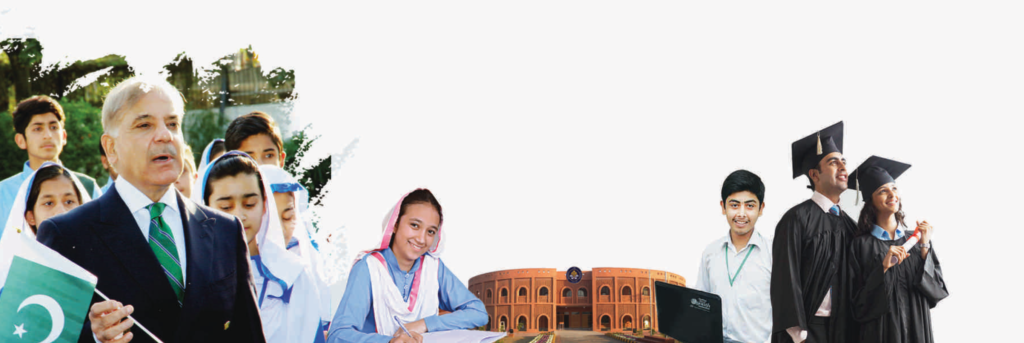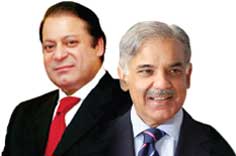Human Capital Development Performance 2013-2018

Education
Ensured access to basic education for all
- Increased Punjab’s education participation from 83% to 92% through enrolmentof more than 700,000 previously out of school children
- Enrolled 10,000 students in 14 newly established world class schools under the Danish School Authority
- Set up and revamped NIO,OOO schools educating over 2.5 M students through public private partnerships
- Introduced early childhood education in selected public schools
- Awarded need based scholarships worth Rs 17 billion through the Punjab Education Endowment Fund (PEEF)
- Introduced free transport in ICT Federal schools
Expanded learning
- Developed interprovincial consensus on curriculum through establishment of National Curriculum Council
- Developed world class textbooks and teaching manuals setting the stage for a pedagogical revolution
- Formulated TVET policy and introduced vocational track in public schools
Implemented an integrated quality strategy
- Developed National Education Standards (NES) setting a minimum common benchmark for the country’s schools
- Increased student learning outcomes by 22 percentage points through:
- Conducting effective assessments
- Developing quality teaching materials
- Introducing mandatory teacher training
Closed the HR and infrastructure gap
- Increased provision of basic facilities from 70% to 99%
- Recruited 300,000 new teachers on merit
- Recruited 3,000 young managers as AEOs
- Revamped governance and education financing
- Strengthened a digital monitoring system for public schools to drive accountability
- Disbursed 14 billion Rupees to schools for financial and administrative empowerment
Higher Education
Improved access
- Increased funding for higher education by 75%
- Provided scholarships to 150,000 students from underprivileged areas through the Prime Minister scholarship scheme
- Introduced the Prime Minister laptop scheme
- Established 27 new colleges andl4 new universities in Punjab since 2008
- Provided 350,000 merit scholarships, worth Rs. 17 B, under the Punjab
- Education Endowment Fund (PEEF)
- Committed to establish a university in every distrid of the country
- Increased enrollment by 8% per year, from 1.14 M to 1.7 M
- Improved proportion of female students to 48%
Enhanced quality
- Selected Chairman HEC, VCs, and faculty purely on merit
- Established Quality Enhancement Cells at public universities
- Allocated Rs. 3 B to support I,000-1,500 Ph.D. students in advanced countries
- Signed agreements with major partner countries, including US, UK, France, Germany, Italy, China, and Turkey, for placement of Ph.D students and postdoc scholars
- Established Centers of Advanced Studies (CAS) in water, energy, food security, Al, metadata, and robotics
Encouraged Quality Research
- Provided research funding to university faculty members to undertake publishable research
- Signed agreements with partner countries to support collaborative research involving both Pakistani and non-Pakistani academia
- Produced more Ph.D.’s in last 5 years than in the previous 65 years
- Improved the number of research journals and research articles published in Pakistan.
- Increased faculty strength by 60 %
- Increased the proportion of faculty members with PhD. degrees from 26 to 28 per cent
Improved system’s efficiency
- Established Pakistan Education Research Network (PERM) as a dedicated fiber optic network for national and international inter-university connectivity. It connects 56 universities and other academic institutions at speeds of 10 Gbps
Enhanced relevance of education
- Provided targeted research funding to promote umversifvmdustry linkages
- Established Offices of Research Innovation and Commercialization (ORICs) at public universities to promote practical research
- Established professional bodies in applied domains (nursing, pharmacy, business management) to review and approve curricula and programs in their fields
Research and Innovation
Established new facilities for technology and innovation
- Established Science and Technology Park at NUST through cooperation with China and Turkey
- Established National University of Technology
- Established Advanced Technology Training Center at Knowledge Park, Muridke
- Upgraded COMSATS Institute of Information Technology as COMSATS University
- Passed legislation for Pakistan Council for Science and Technology (PCST) Act 2017
Strengthened existing institutions to drive innovation
- Strengthened National Institute of Oceanography (N10) for marine research Completed building, modernization & rehabilitation of PCSIR/NPSL at a cost of Rs. 700 M
- Established new laboratories under Pakistan Standards & Quality Control Authority
Launched targeted interventions to promote innovation
- Started Science Talent Farming Scheme (STES) for Young Students at a cost of Rs. 3 B
- Developed bilateral cooperation with China, Sri Lanka, Belarus, Iran, Turkey and Tajikistan for HR development and transfer of technology
- Provided need-based R&D assistance to public and private sectors to encourage innovation
- Upgraded Pilot Plants at major centers and established mechanical workshops under PCSIR in several major cities
- Established water quality testing laboratories in 24 districts and National
- Capacity Building Institute for water quality management in Islamabad
Health
Safeguarded child’s right to life
- Increased the rate of fully immunised children from 49% to 84%, covering 1M additional children
- Improved rate of safe deliveries from 68% to 81%
- Eliminated Neo-Natal & Maternal Tetanus from Punjab
- Reduced Polio cases from 306 in 2014 to 3 in 2018
- Treated 222,525 SAM and 634,602 MAM children
- Enhanced breast feeding rate from 16.8% to 30.7%
- Increased TB detection by 12%, with 93% success rate
Enhanced health access and coverage for the poor
- Opened access to private hospitals for 3M abject poor through PM’s National Health Program in 44 districts
- Added over 7,000 hospital beds across Punjab
- Revamped 15 THQ and 25 DHQ hospitals
- Added 800 new 24/7 BHUs, and installed 1,000 ultrasound machines to ensure safe births
- Introduced 933 ambulances in rural and urban areas
- Set up 125 Hepatitis Clinics to contain the epidemic
- Established 4 Burn Centers and 2 Regional Blood Centers
Increased healthcare funding
- Increased healthcare financing from 0.27% of GDP to 0.91%
- Increased Punjab’s health budget by 200% since 2012-13
Produced world-class health workforce
- Recruited additional 5,000 doctors, 3,800 Post Graduate Specialist Trainees and 8,000 nurses
- Established 3 medical universities and 4 medical colleges
- Upgraded 7 nursing schools to colleges
Channelized resources for sustainable population growth
- Conducted the long pending population census for effective planning
- Setup a Punjab Population Innovation Fund to generate creative models for family planning and reproductive health
- Ensured over 95% availability of contraceptives at family health clinics and family welfare centers across Punjab
ENVIRONMENT
Established legislative framework for environmental protection
- Passed landmark Pakistan Climate Change Act 2017
- Ratified the Paris Climate Agreement 2015
- Forwarded Pakistan’s Intended Nationally Determined Contribution (INDC) to the UN, committing to reduce greenhouse gas emissions
- Approved first National Water Policy of the country to tackle water shortages and encourage conservation
Strengthened institutions to provide foundation for future reform
- Introduced reforms to strengthen and revitalize Global Climate Impact Studies Centre
- Established an interprovincial body (NCCPIC) to monitor, oversee and coordinate actions by various ministries
- Strengthened Forests Department to enable better implementation of anti deforestation efforts
- Fortified Pakistan Meteorological Department and National Disaster Management Authority by introducing cutting edge technology
Formulated effective policies to guard against environmental degradation
- Developed 1,500 MWs of large-scale renewable energy projects
- Developed a holistic National Forests Policy
- Enforced EURO II standards for fuel in Pakistan
- Halved duty on electric vehicles
- Launched the Green Pakistan Program in 2016 aimed at building resilience against climate change through initiatives like afforestation and conservation of biodiversity
- Established Pakistan’s first Marine Protected Area (MPA) at Astola island off the coast of Pasni


